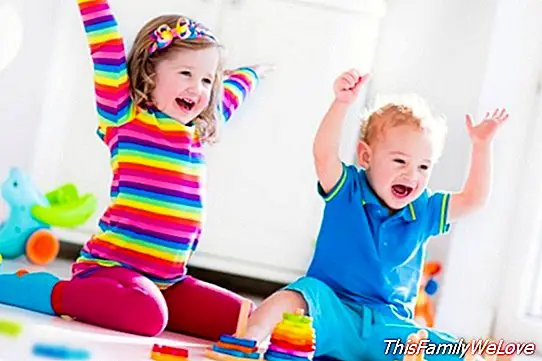Nursery or nursery school: love and professionalism

Your maternity leave is over and you have decided to take the child to the nursery or nursery school, but you still have that little doubt in your heart, in case you will be treated with the affection you deserve. How is a Technical Specialist in Early Childhood Education?
As is logical, parents are not supplied. The affection that you can give to your children is irreplaceable, but you should not think that by taking your child to the nursery or nursery school you are advocating an affective lack. Today, there are training centers for Specialized Technicians in Early Childhood Education, which are very aware of the field of affectivity within their curricula.
How do you care for my baby when he cries in the nursery or nursery?
In the curriculum marked for the formation of Technical Specialists in Early Childhood Education, There is a specific subject in which affective development of children is addressed, where the figure of parents and professionals in the affective education of each age is seen. The attachment figure is worked on, jealousy, tantrums and, through practical cases, situations of jealousy, tantrums, etc. are analyzed, which also occur in babies.
1. When a child criesThese professionals know that crying is the baby's way of communicating. Especially in the first months, the child cries to demand and cover their basic needs: eating, sleeping, cleaning ... Educators know that this claim must be addressed, since it is the best way to provide security for children. The nursery teachers, with official qualifications, are highly qualified to attend and supervise groups of up to eight children under one year of age, without prejudice to any of them.
2. And if my baby cries, do they catch or cradle my child? The answer is that each child is treated in a personalized way: it is seen if he has all his needs covered, he is given a pacifier, he tries not to cradle him, but a song is sung to help him fall asleep. If, despite all this your baby is still crying, it is normal to be taken out of his crib, put a blanket on the floor and give him toys to distract him, until he calms down.
Bites in the nursery or nursery school
It is normal that from the eight or nine months Small rivalries begin for the possession of a toy, or for any other unimportant reason. Being so small the technique that is followed is to make the "aggressor" see, through a firmer tone of voice, that that is not right. The nursery teacher removes him from the group for a few minutes and later, tries to kiss the child "assaulted".
Experience shows that, in a few days, it is the children themselves who know how to react to these circumstances. The child who has been bitten by his caregiver gives him an "extra portion" of pampering, and if necessary, he puts a little anti-inflammatory ointment on the affected area.
Nursery or nursery school: formation of the feeling of trust
Affectivity in the life of the child It has a great impact on your adult life. The affective life of the child is the foundation of the affective life of the adult, structure in some way its character and personality. A good educator knows that it is very important to develop a strong and secure personality in children. This aspect is worked in depth in their training, because to the extent that babies receive an answer, their behavior is reinforced, the child he repeats and thus perfects his learning.
The formation of the feeling of trust basic begins to acquire around 10 months. The child begins to clearly differentiate acquaintances and strangers. He is very attached to his primary caregiver and fears strangers. Shyness appears in front of new situations. Towards the year, the fear diminishes, when the stability of the family or the educational center gives it confidence.
A happy child It is the first manifestation that they are really applying an adequate stimulation program in the nursery or nursery school. However, you always have to involve the parents, because you are the true protagonists of learning, the educators help this stimulation, but they do not make up for it. Parents play a fundamental role in the development of their children. With the support of the affective bond, educators can contribute through a good stimulation to form a person with a greater, sociable, self-confident, emotional capacity for learning.
Ana Aznar
Advisors: Cristina Gutiérrez, Coordinator of the Superior Formative Cycle of Infant Education of Development-Foundation.
Yolanda Castañeda, teacher in this Center and in the Villanueva University Center.




